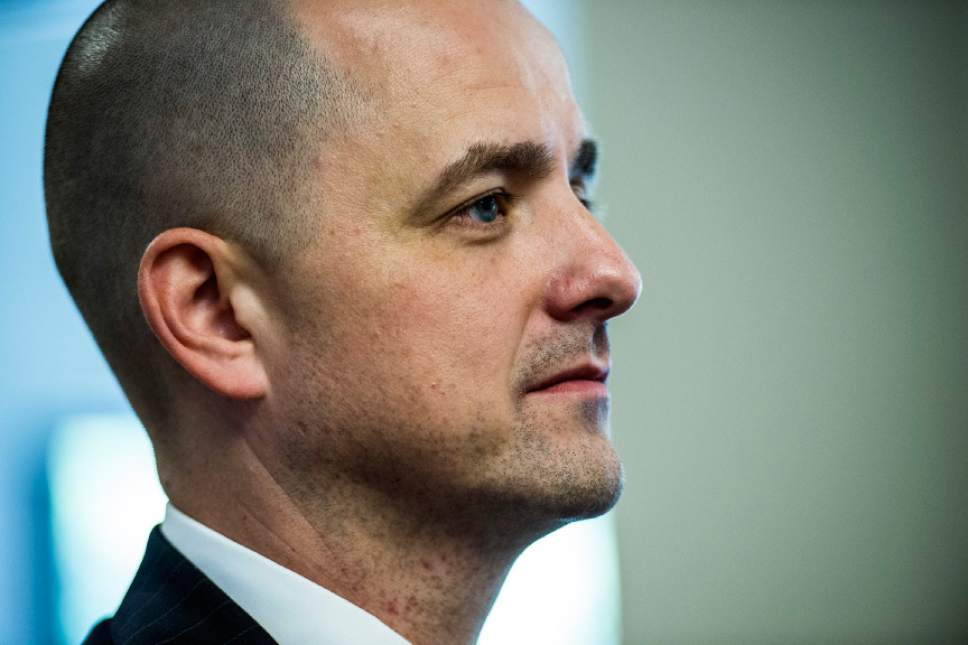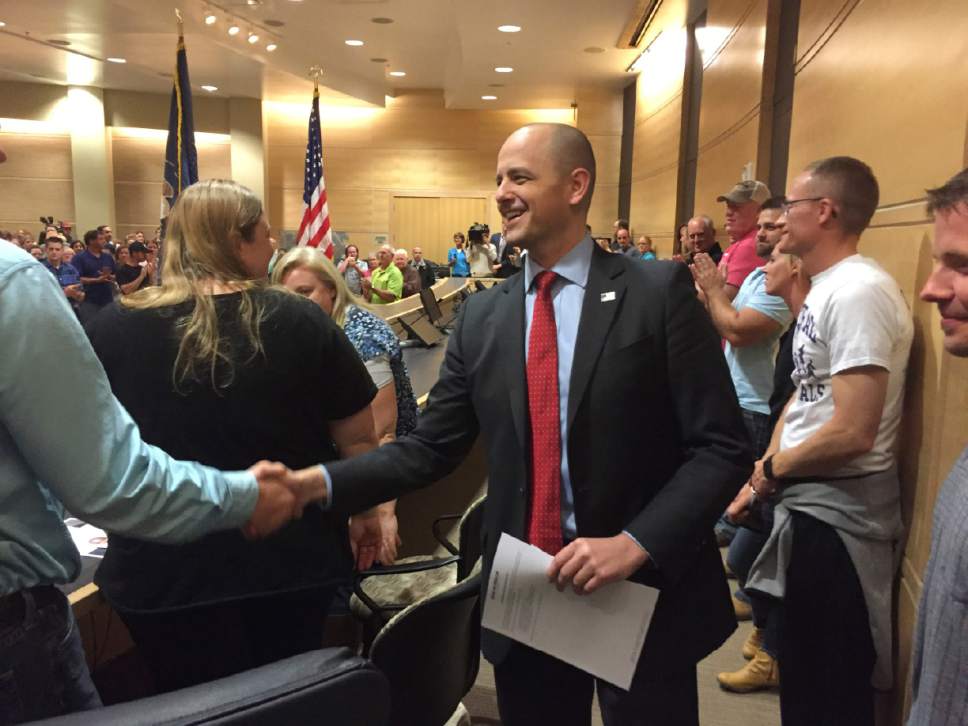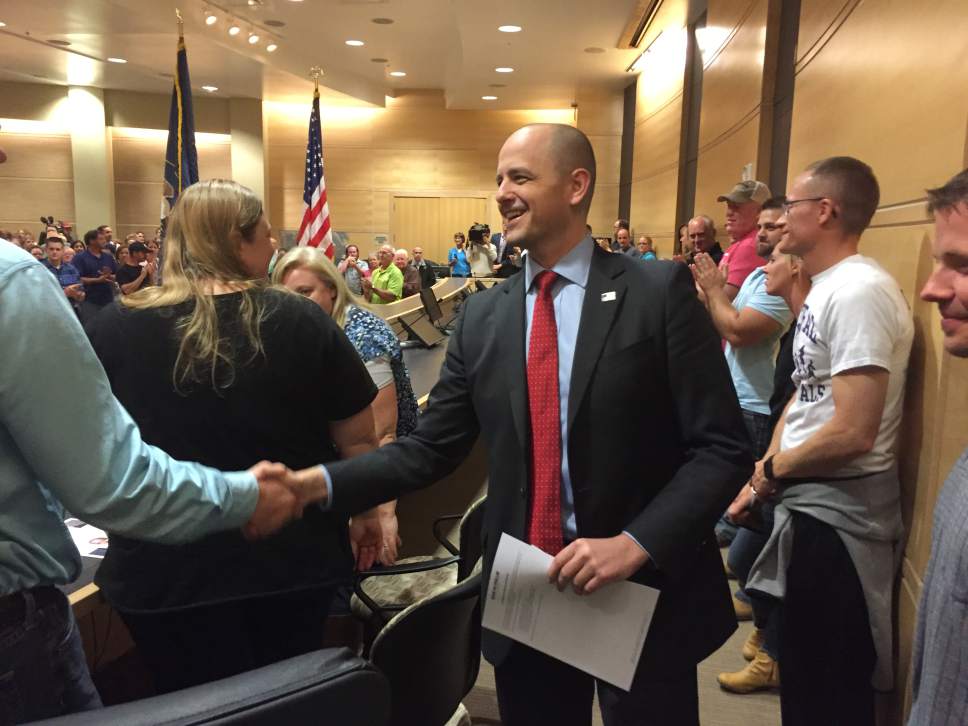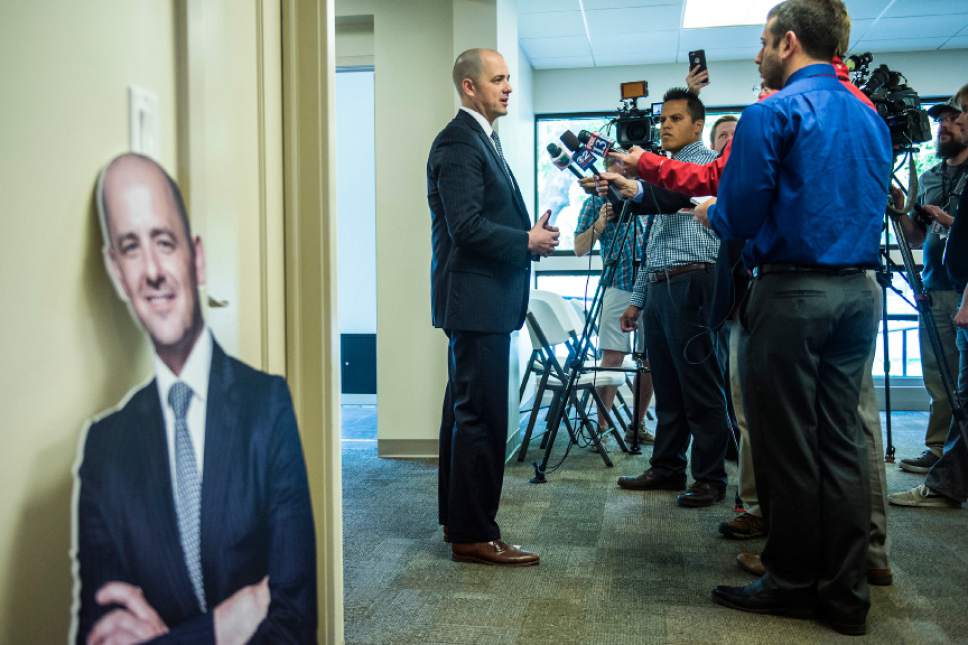This is an archived article that was published on sltrib.com in 2016, and information in the article may be outdated. It is provided only for personal research purposes and may not be reprinted.
Syracuse • More than 100 people waited in line Thursday evening for the chance to take a picture with a presidential candidate who, a few weeks ago, they had never heard of, and who is on the ballot in only 11 states.
But Evan McMullin, running as a conservative independent, isn't Donald Trump, and he isn't Hillary Clinton either, and that has a growing group of disenchanted Utah Republicans giving him a chance to win their votes. Polls show him within striking distance of the major party candidates in Utah and in reaction, the McMullin campaign is spending extra time in the state.
Joined by his running mate, Mindy Finn, McMullin spent an hour displaying his reverence for the Constitution and his desire for a smaller government, but really he was providing catharsis and maybe even a little hope for voters who felt trapped by candidates they saw as unworthy of their support.
Greg and Janean Haeffele, of West Point, were two of the more than 400 people who crammed into Syracuse's city hall, some of whom sat in the lobby or on the floor.
After rejecting Trump as "evil," the Haeffeles planned to write in Mitt Romney's name. But then they learned that their votes wouldn't count because the 2012 Republican presidential candidate isn't a registered write-in candidate. At that point, they decided to not vote for the first time in their lives.
Janean Haeffele stopped following the campaign because it was "very upsetting." Then a Facebook post caught her eye. It was a notice about McMullin's town hall.
The couple attended, as Greg put it, "desperately seeking a qualified candidate for president" and McMullin won them over.
"He is our man," Janean said afterward. "I think he would do a lot of good for the nation."
A clear pattern emerged after more than a dozen interviews with town hall attendees. These were Republicans, most of whom kept close tabs on politics, who felt that Trump wasn't a conservative or a decent man and who didn't seriously consider a vote for Clinton. And they were deeply concerned about what they would do with their votes.
Syracuse Mayor Terry Palmer, a lifelong Republican, considered voting for Trump for a while, even as he searched for alternatives among the third-party candidates. A video, showing Trump bragging about his ability to grope women without their consent, pushed him over the edge.
"I'm scared of him, of what he'll do," Palmer said. "I feel like our president should be someone we admire for their character and the principles they keep."
Shellie Ferry, of Clearfield, believes Trump is a racist and no racist should be president, but she feels Clinton lacks the leadership needed to do the job.
"I just don't see her as anything more than a power-hungry woman," she said.
She looked at Libertarian candidate Gary Johnson and the liberal Green Party candidate Jill Stein before she began leaning toward a vote for McMullin.
"I didn't want to not vote," she said, "but I didn't want to vote for someone I don't want."
McMullin's biggest hurdle is his viability. He acknowledged to the crowd that his chance of winning the race is a long shot, requiring Clinton and Trump to be locked in a close battle, while he wins at least Utah, if not other states. If no candidate gets 270 electoral votes, the U.S. House of Representatives decides who is president. That has happened twice, the last time being in 1824.
Julie Moncur, who drove down from Pocatello, Idaho, to see McMullin, said she understands that her vote for McMullin may be more symbolic than anything.
"I feel like even if I vote for him and he doesn't make it into office, it is not a wasted vote," she said. "I wanted to vote for what I believe in."
Before McMullin jumped into the race in August, largely as an alternative to Trump, Moncur would regularly joke about moving to Canada. Underlying that was some serious stress over the election that has now lifted some.
"This movement will give people courage," she said.
McMullin is selling his candidacy not only as a vote for "what we know is good and true" but a chance to create a new "conservative movement" following the 2016 election, either within the Republican Party or in some other form.
He was born in Provo and raised in rural Washington state. He's a Mormon who went to Brigham Young University, where he was tecruited by the CIA. After 10 years with the spy agency, McMullin worked for Goldman Sachs and then took a job with House Republicans in Washington.
When Trump claimed the nomination, he felt someone needed to challenge him. When no one did, McMullin prayed.
"During that process, I gained a conviction that this needed to happen and I gained a conviction that if nobody else was going to do it, then I would do it," he said.
The McMullin campaign is headquartered in Utah and he gained some early traction here, but then the vulgar Trump video emerged. A group of high-profile Utah Republicans, including Gov. Gary Herbert, disavowed Trump, giving voters the green light to look elsewhere. Since then, two polls show McMullin in third place but gaining on Trump and Clinton. Some Utah Republican insiders expect his surge to continue as Republicans and independents flee Trump.
During the town hall, McMullin struck out positions that were familiar and comforting for those in attendance. He would protect gun rights and keep the Guantanamo Bay prison open to hold terrorists. He believes Social Security must be reformed, and the retirement age extended, to reduce the nation's debt. He wants a simplistic tax plan with just three rates. He thinks the nation should accept refugees from Syria and give undocumented immigrants a path toward legal residency, if not citizenship. He'd consider a more aggressive response to the civil war in Syria, though not a full-fledged ground invasion.
But he also suggested an idea that's novel among Republicans. McMullin wants at least some states to offer a "wage supplement" for low-income workers, where the government would pay them on top of their employer's pay for the hours they work. He thinks that would combat poverty.
The idea was met with applause.
Rebecca Baak of Kaysville wasn't going to vote before she heard about McMullin. After the town hall, she said: "I'm excited to stand up for true American values."
Volden Burke of Layton just appeared relieved. "Evan presented the ability for me to vote with a clear conscience," he said.
And it is those Utahns, desperate to like and trust the candidate they vote for, who could allow McMullin to become the first candidate outside the two-party system to claim electoral votes since 1968.
Editor's note: This story has been updated to reflect that the House has picked the president.
Twitter: @mattcanham









